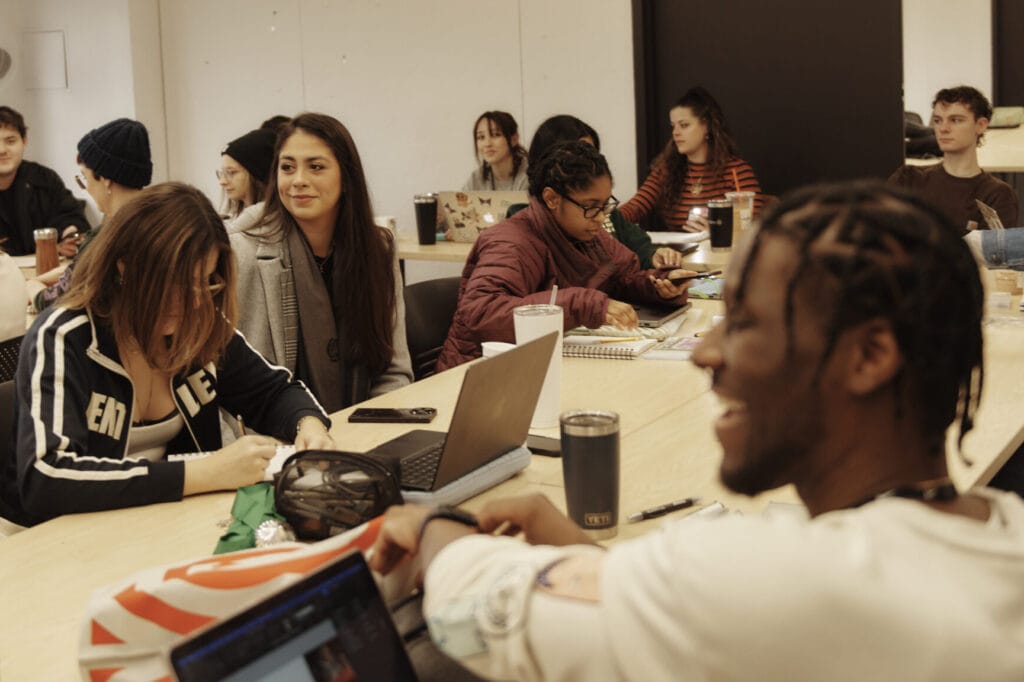Types of Aid
Explore the many different options that are available to you for financing your MassArt education.
As a MassArt undergraduate, you have a wide variety of aid options. Financial aid comes in different forms and from different sources, each with specific qualifications and repayment requirements.
Grants do not need to be repaid and are generally awarded based on financial need.
Cash Grants are awarded by the College to needy Massachusetts residents pursuing their first bachelor’s degree.
A MassArt Grant is a need-based grant awarded by the College.
The Federal Pell Grant is awarded to undergraduates who demonstrate exceptional financial need. Eligibility is based on a student’s Student Aid Index as determined by the FAFSA.
The Federal Supplemental Educational Opportunity Grant (SEOG) is awarded to some Pell Grant recipients with exceptional financial need.
- The MASSGrant is a state-funded program that awards grants to eligible MA residents who complete their FAFSA by May 1. Funds are awarded to financially needy students with no prior bachelor’s degree.
- The state may require additional information from a student’s family to determine eligibility. If additional information is requested, it is important to comply immediately. Students who do not comply in a timely manner lose their award.
- Non-Massachusetts residents should check with their state’s scholarship office to determine eligibility for state-specific awards and whether they’re transferable to MassArt.
- Please notify MassArt’s Office of Student Financial Assistance if you receive a transferable award from outside Massachusetts. It will be included in your financial aid package.
Scholarships do not need to be repaid. They are usually awarded based on merit, though some may also have financial need requirements.
- All MassArt applicants are automatically considered for applicable merit scholarships. No additional application is required.
- Accepted applicants are reviewed beginning March 1, and recipients will be notified of their award by letter in the Admissions portal. You may receive your scholarship for up to eight terms unless you’re an Art Education major, in which case your scholarship may be applied to the required ninth term.
- If you enroll in six credits or less, your scholarship will be pro-rated to 50 percent of that term’s award.
- Students with merit scholarships have their eligibility re-evaluated at the end of each term. Students on Academic Probation or Subject to Dismissal will lose their scholarship.
- If you lose your merit scholarship due to an extenuating circumstance, you may appeal for reinstatement. Commonly accepted grounds for appeal include:
- Serious ill health
- Significant accident or injury
- Bereavement due to the loss of a close family member
- Victim of a crime
- Other unforeseen circumstance
- Applicants and returning students are also automatically considered for MassArt’s endowed scholarships based on academic and demographic criteria. Eligible applicants are identified during the application review process and forwarded to the scholarship committee for consideration.
- Returning students may be nominated by faculty and then reviewed by the scholarship committee.
- Some endowed scholarships are renewable, some for only one year.
- MassArt President’s Scholarships are for accepted Massachusetts first-year and transfer applicants. They are merit-based, and financial need is not a factor. These scholarships are renewable for up to four years.
- The Senator Paul E. Tsongas Scholarship is awarded annually to five Massachusetts first-year students and covers all tuition and fees for four years. Recipients must place in the top ten percent of their class or hold a grade point average of 3.75. They must also have a combined SAT score of 1200 or higher or have earned at least two grades of at least 3.5 (B+) or better in advanced placement or honors courses.
- Tsongas Scholars are chosen from accepted applicants who meet these criteria, and who also have exemplary portfolios and other admission submissions
- Preference is given to candidates who demonstrate financial need.
- The John and Abigail Adams Scholarship is for students graduating from Massachusetts high schools. This scholarship is a tuition credit and does not cover room and board, fees, or expenses. Students may not use more than one tuition credit toward their Cost of Attendance.
- The tuition credit will be extended for eight consecutive semesters, as long as the student is enrolled in 12 or more semester credits, and is not on academic probation or subject to dismissal.
- Eligibility criteria can be found at Massachusetts Department of Elementary and Secondary Education
- MassArt Dean’s Scholarships are merit-based awards for accepted first-time first-year and transfer applicants from New England. These scholarships are renewable for up to four years.
- The Trustees Scholarship is awarded to six recipients per year, It covers all tuition and fee charges and is renewable for up to four years. Scholarships are awarded to students with high grades and outstanding portfolios who also have demonstrated financial need. The scholarship is available to US citizens and legal permanent residents.
- MassArt Provost’s Scholarships are merit-based awards for accepted first-time first-year and transfer applicants from outside of New England. These scholarships are renewable for up to four years.
- The Trustees Scholarship is the highest award for out-of-state applicants. Awarded to six recipients per year, It covers all tuition and fee charges and is renewable for up to four years. Each year, the selection committee identifies up to six Trustees Scholarship recipients. Trustees Scholarships are awarded to top academic students with high grades and outstanding portfolios who also have demonstrated financial need. This scholarship is available to US citizens and legal permanent residents.
- Art Deadlines List
- Berkshire Taconic Community Foundation
- CollegeBoard
- CollegeNET
- College Planning Center
- CareerOnestop.org
- National Scholarship Directory by FastWeb
- Rhode Island Foundation Scholarship/Fellowship Opportunities
- Scholarship System
- Scholarship America
- Scholarships for Veterans
- Unafraid Educators Scholarship List
- Unigo
Tuition waivers do not need to be repaid and cover partial or total tuition costs. Waivers do not cover costs such as fees, books, and living expenses.
- The Armed Forces Tuition Waiver is for active members of the armed forces stationed in Massachusetts. Members of the MA Army or Air National Guard are eligible for 100 percent tuition and fee remission. Please contact the Massachusetts Army National Guard Education Services Office for more information.
- The Veterans Tuition Waiver is for students who have served in the armed forces.
- The Higher Education Employee Tuition Waiver is for higher education employees, their spouses, and dependent children. Guidelines are established by the Department of Higher Education. Appropriate documentation may be obtained by contacting your institution’s human resources office.
- The Massachusetts Rehabilitation Commission Tuition Waiver is for clients of the Massachusetts Rehabilitation Commission. Please contact your Massachusetts Rehabilitation Commission counselor for more information.
- The Massachusetts State Employees Tuition Remission Program is for state employees and their spouses. A Tuition Remission Certificate must be completed by the employee and their Human Resources Office and submitted for each semester the student is enrolled.
- Native American Tuition Waivers are for American Indian residents of Massachusetts who attend a state college or university. Contact the Massachusetts Commission on Indian Affairs for information and an application.
- Senior Citizen Tuition Waivers are for Massachusetts residents over 60 years old. Please submit a driver’s license, birth certificate, or other evidence of age verification to the Office of Student Financial Assistance.
- The Massachusetts Department of Higher Education Stanley Z. Koplik Certificate recognizes high academic achievement on the MCAS and other measures of academic accomplishment. Recipients must maintain a college 3.3 GPA or the equivalent. The Massachusetts Department of Education determines Koplik Certificate of Mastery tuition waiver awards.
- The Valedictorian Program Tuition Waiver is for Massachusetts high school students who have been designated as valedictorians.
- The DCF Adopted Child Tuition Waiver and Fee Assistance Program is designed to lessen the financial burden on adopting parents in the Commonwealth. It is for children and young adults, age 24 or under who have been adopted through DCF by Massachusetts employees or residents.
- The DCF Foster Child Tuition Waiver and Fee Assistance Program provides financial support for children in state custody who were not adopted or reunited with kin.
- Federal Work-Study is a need-based work program that allows students to work at MassArt to help pay for their education.
- Work-study students earn $15/hour and are paid biweekly. Students usually work eight to 15 hours per week.
- Work-study earnings can be used for any educational or personal expenses; but are not credited to the student’s billed expenses.
- Students take on a wide variety of roles and responsibilities, from supporting administrative offices and leading campus tours to helping in a studio or gallery.
- Hiring managers will use Interview Exchange to post available positions for hire or re-hire. Students not able to find a work-study job will NOT receive additional funding to replace expected work-study earnings.
- Yes. Work-study students interested in working off-campus may apply for community service work-study jobs through the Center for Art and Community Partnerships.
- Student loans are aid that must be repaid as described in each loan’s Promissory Note.
- he Federal Direct Subsidized Stafford Loan is based on financial need. The federal government pays the interest on a subsidized loan while the student is enrolled in school for at least six credits per semester, and during authorized deferment periods.
- The Federal Direct Unsubsidized Stafford Loan is provided regardless of financial need. The student is responsible for all interest accruing while they are enrolled in school, during grace periods, and during authorized deferment periods.
- You may either pay the interest or capitalize the interest on an Unsubsidized Stafford Loan. Capitalization means the unpaid interest will be added to the principal balance of the loan at the beginning of the repayment period.
The aggregate Stafford Loan limit for a dependent student is $31,000 ($23,000 of which may be subsidized). The aggregate Stafford Loan limit for an independent student is $57,500 ($23,000 of which may be subsidized).
Repayment begins six months after you graduate, withdraw from the college, or drops to less than half-time enrollment. In order to receive a Stafford Loan, you must be enrolled for at least six credits per semester and must be maintaining satisfactory academic progress.
| Grade Level (# of Credits Completed) | Dependant Student (Combined Subsidized and Unsubsidized) | Independent Student (Combined Subsidized and Unsubsidized) |
|---|---|---|
| First Year (0-29 Credits Completed) | $5,500 no more than $3,500 may be subsidized | $9,500 no more than $3,500 may be subsidized |
| Second Year (30-59 Credits Completed) | $6,500 no more than $4,500 may be subsidized | $10,500 no more than $4,500 may be subsidized |
| Third Year (60-89 Credits Completed) | $7,500 no more than $5,500 may be subsidized | $12,500 no more than $5,500 may be subsidized |
| Fourth Year and Beyond (90 or More Credits) | $7,500 no more than $5,500 may be subsidized | $12,500 no more than $5,500 may be subsidized |
The NIL is offered to needy Massachusetts residents with zero interest. It requires repayment to begin six months after the borrower graduates, withdraws, or drops to less than half-time.
- If the aid you’ve accepted does not cover the total cost of your education, then a private student loan may help. Your maximum eligibility for an alternative loan is your Cost of Attendance minus any other aid you’re receiving.
- Alternative loans are not based on need but on creditworthiness. Therefore, borrowers are required to have a creditworthy co-signer who is a U.S. citizen or a non-citizen permanent resident.
- To determine which loan best meets their needs, we encourage students to carefully review factors like interest rates, APR (Annual Percentage Rate), the length of repayment, minimum and maximum loan limits, and fees.
- We recommend that students apply for only one or two alternative loans each year. If you apply and are approved for more than one alternative loan, please let our office know which one you wish to borrow from. Otherwise, we will certify the first application we receive, and cancel any others.
- Student Financial Assistance will certify all loans to disburse for both the fall and spring semesters unless otherwise notified by the student. Students should notify the office if they would like a one-term disbursement after they have completed the loan application process.
- These lenders offer private student loans with competitive rates while providing good customer service and electronic loan processing. You are welcome to borrow from the lender of your choice without penalty, whether or not that lender is identified here, or in other materials produced by MassArt. MassArt does not endorse any one loan product.
If you have any additional questions about borrowing a private loan, please call the Office of Student Financial Assistance at (617) 879-7849.
- Federal Parent Loans for Undergraduate Students (PLUS) are loans taken out by the parent of a dependent undergraduate student to supplement their student’s aid package. The loan can help cover the total Cost of Attendance (including tuition and fees, living allowance, and any other eligible school expenses). It is not based on financial need but on creditworthiness.
- Parents borrow directly from the U.S. Department of Education and repay to an approved Federal Student Aid Loan Servicer, while MassArt’s Office of Student Financial Assistance processes the loan.
- Repayment for student loans begins six months after the student graduates, withdraws from the college, or drops to less than half-time enrollment.
- You can review current Federal interest rates and fees on studentaid.gov.
Step 1: Apply for the Parent PLUS Loan
- To request a Parent PLUS Loan, parents will apply online at studentaid.gov. They’ll need to sign in to their Direct Loan account with their FSA ID. Once signed in, they can click on “Apply for a Direct PLUS Loan” to apply.
- If approved, MassArt will be notified, and will add the loan to the student’s account as a pending credit.
Step 2: Master Promissory Note
- New PLUS Loan borrowers must complete a one-time Master Promissory Note (MPN) once their application is approved. The MPN will cover all PLUS Loans borrowed over the course of the student’s education at MassArt. It provides the Lender with the information they need to process the loan and to ensure that the lendee understands and agrees to the terms of their loan.
- To access their MPN, parents will need to sign into their Federal Student Aid Account and click on “Complete Loan Agreement (MPN).”
Step 3: Review the Disclosure Statement
- Before the loan is disbursed to the College, a disclosure statement will be sent to the borrower regarding the loan amount to be disbursed. A parent may adjust the amount or even cancel the loan within 14 days of disbursement by contacting the Office of Student Financial Assistance at (617) 879-7849.
- After the loan has been disbursed to the College, if the parent wishes to return funds to the lender, they may contact Direct Loans at 1 (800) 848-0979.
Please Note: If your student is expecting a financial aid refund for living expenses or art supplies because the financial aid is greater than your student’s school bill, you must be sure to complete these loan instructions prior to the start of the semester term to ensure that your funds will not be delayed. The first refund of the semester will not be available generally until mid-October during the fall semester, and mid-March for the spring semester. This is due to a federal regulation that states that the student is not entitled to all of the financial aid until 60 percent of the semester has passed. Please plan your finances accordingly.
- Eligibility for the PLUS Loan depends on a modest credit check that determines whether the parent has an adverse credit history. If a dependent student’s parent is denied a PLUS Loan, the student becomes eligible to borrow more Unsubsidized Stafford Loan funding, up to $5,000 additionally, depending on their grade level.
- If denied, a parent may appeal the decision, or obtain a credit-eligible endorser to co-sign the loan. If you have any questions about the reason for a denied PLUS Loan, you may contact the Direct Loan Origination Center at 1 (800) 557-7394.
- Direct Parent PLUS Loan repayment begins 60 days from the date the loan is fully disbursed.
- Parents have the option to defer their PLUS Loan repayment while their student is enrolled for at least six credits per semester, but can choose to pay off the accumulating interest during that time.
- To defer repayment for their PLUS Loan, parents must contact the Direct Loan Servicing Center at 1 (800) 848-0979 after the loan has been disbursed to the College.
Refunds are typically issued mid-October for the Fall semester and mid-March for the spring semester (as long as the financial aid funds have been received by the College).
If the amount of the Parent PLUS Loan exceeds the full billed expenses, and the parent borrower requested to receive the refund in their Parent PLUS Loan application, a refund will be mailed to the parent borrower.
The Business Office disburses the refunds, and will notify students via MassArt email when refunds are available.
Students that want to use their financial aid to buy books and supplies at the bookstore can get bookstore vouchers during the first two weeks of each semester.
Dropping or withdrawing from classes may affect your financial aid, not to mention getting your degree in a timely manner. See more on the withdrawal and refund policy.
Outside Assistance May Impact Your Financial Aid
You must inform the Office of Student Financial Assistance in writing of all financial aid received from other sources. Please email a copy of your award notification to financialaid@massart.edu.
In some cases, financial aid may be adjusted because of outside scholarships or assistance. If this is the case, we’ll do everything possible to protect your grant aid. Outside assistance may also reduce your eligibility to borrow federal funds or receive work-study. It is your responsibility to ensure that MassArt receives these outside funds.









